- What John Lennon Thinks of Donald Trump - November 14, 2016
- The Meaning of Fun: The Paul is Dead Rumor - February 3, 2016
- BEATLES-STREEP-SHEA SHOCKER: IT’S NOT HER!!!! - August 13, 2015
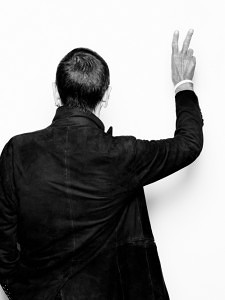
“Peace, wall.”
DEVIN McKINNEY • Ringo is on the cover of the latest Variety, heralding a celebrity profile by Assistant Managing Features Editor Steve Chagollan that is not only indifferently written but, typical for an age in which basic compositional standards are plummeting faster than an anvil lofted from the Empire State Building, is dotted with stylistic and factual boo-boos. (Ringo’s wife is referred to as “the actress formerly known as Barbara Bach”; what is she known as now, The Actress?)
Still, the piece offers a brand-new, piping-hot array of Ringo opinions (he thinks Di Caprio is a lock for The Wolf of Wall Street), the latest line on his relationship with Paul (“stronger than ever”), and scraps here and there of useful-seeming information (we’re reminded that a recurrent member of Ringo’s All-Starr Band is Todd Rundgren, whose anti- or at least less-than-overwhelmingly-pro-Beatle views have been a subject of discussion here and there).
The article makes at least one excellent point along rock-historical lines. The moment when the Beatles retreated to the studio to make more sophisticated music—and when Ringo’s drumming became, of necessity, more subtle, flexible, skillful, incisive, and, in the best sense, serviceable—was exactly the moment that groups like the Who, the Jimi Hendrix Experience, and Led Zeppelin took the world stage with wildly flamboyant drummers. (Don’t forget the Muppets, who had Animal.) Ringo (the musician, if not the actor-personality) was out of the public eye, doing his work head-down in a lab, just as the arena-rock age descended and the Cult of the Drummer was being forged—a common crown later to be carried by successors Neal Peart, Alex Van Halen, et al, all of whom are considered by the conventional wisdom of dolts and dullards (though not by the musicians themselves) to be incomparably, laughably superior to Ringo.
This sounds very much like one reason Ringo has always been, as Don Was calls him in this article, “the most underrated drummer in rock history.” While that history favored him in some ways, it did his musical brilliance a disservice by taking him off the stage just when it became clear that the rock public would, at any given time, be most readily impressed by what it could see as well as hear—especially if that “what” had flying arms and two bass drums and made a ton of noise.
Anyway, read. 2014 is not a month gone and Ringo has already been feted by the press for Photograph, his ultra-creamy dee-luxe picture book, and by the David Lynch Foundation for his decades-long devotion as a Transcendental Meditator. I lack the cash to buy the former and the patience to make a go of the latter, but I salute Ringo at all times, in all phases, as a man for all seasons, and I’m glad that in his winter, the world is giving him the warmth he deserves.

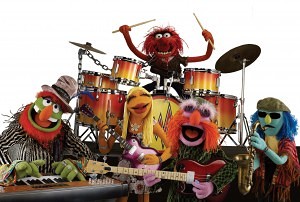
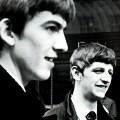
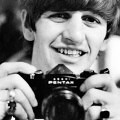
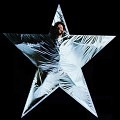
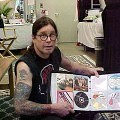
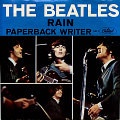
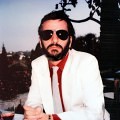

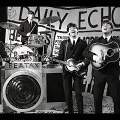
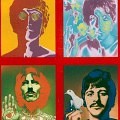
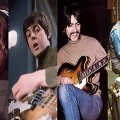
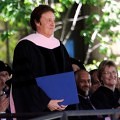
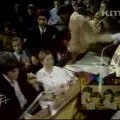
Nothing burns me up quite like the “Ringo isn’t a good drummer” meme. It is just so wrong. I made the mistake of reading the comments section of a Rolling Stone article about Paul and Ringo playing Queenie Eye at the Grammys. Nothing but a bunch of know-nothings blathering on about how Bernard Purdie played all his parts on the records, and other debunked conspiracy theories….. blah blah blah. I’ve been a musician for 25 years, I’ve done studio recordings, all sorts of stuff, and I can tell you that one thing that can’t be faked is great drumming. Hats off to Ringo. He can play in virtually any style and he owns it on every one of their albums. I’d take him over Neal Peart any day of the week.
This video, from the affable MJSokes: He recreates Ringo’s work on “The Word” (the most overlooked Beatles song ever?):
http://www.youtube.com/watch?v=6ezlY31kg_E
Sam, this video knocked me out. Perfect demonstration of the skill and imagination Ringo made sound so easy. And I agree, “The Word” is a majorly under-appreciated record, if you’re able to tune out the lyrics a bit and just feel that wonderfully bitter organ, that sharp guitar, those piercing harmonies. There’s that wonderful snarky sound all through Rubber Soul.
Phil Collins knows how good Ringo is. He once said he likes to challenge drummers he knows to replicate what Ringo does, and they’re never able to do it. MJSokes does it, but imagine how many hours he must have practiced just to get one little fill right.
It IS great to see Ringo getting some respect for his musicianship. When I go to see Beatles songs performed live, I’m struck by how how challenging the songs from the studio years are for the rhythm section in particular. When Tributosaurus did “Paperback Writer” and “Rain,” Dan Leali (drums) and Jon Paul (bass) were clearly sweating it out. Was’ point about Ringo’s vanishing from the stage just as drumming became more of a focus in concerts is very well-taken. I can see how that contributed to the idiotic meme of his not being a good drummer.
Also, I always thought that Pete Best was fired from the group not only because he never said anything and didn’t socialize with JP&G, but also because he was most decisively NOT a good drummer and had more or less one style (which Mark Lewisohn maybe mentions a little too often in his book – after a while, the vehemence with which he tries to get this point across gets somewhat annoying), while Ringo was known throughout Liverpool for being very good musically. That said, I don’t really know (or care) what makes someone a good drummer, but I simply don’t think a sub-par musician would have been tolerated in that band…
I’m ambivalent about Ringo and George. On the one hand, I think they were essential because their personalities and musical abilities were well-yoked to John and Paul’s singing, songwriting, and performing talents. Certainly they benefited by osmosis in proximity to John and Paul. On the other hand, I believe any decent Liverpool guitarist and drummer—say, Gerry Marsden and Chris Curtis—could have been just as big stars as Ringo and George had they joined John and Paul at the same time.
Would Gerry Marsden have written “Here Comes The Sun” or “Within You Without You” (or even “Don’t Bother Me” for that matter?) Without George’s songwriting, John & Paul would have fleshed out their albums with more of their own, perhaps less inspired compositions as filler, and the result would have been the 70s solo album syndrome. I can’t imagine the Beatles without George’s songwriting contributions. And Ringo! In addition to his drumming, which is powerful and inventive on even the earliest tracks, like “Please Please Me” had a charisma and charm equal to silent film comedians. How interesting would Chris Curtis have been in the Hard Days Night movie? They wouldn’t even have that title, and they wouldn’t have the “Tomorrow Never Knows” title, both suggested by Ringo’s wordplay, which fit right into J&P’s verbal brilliance.
Okay, I’m sputtering, I’ll stop now.
The Beatles without George and Ringo would’ve been, IMHO, a totally different band.
For one thing, George was there from (almost) the beginning. Would the band have even hung together long enough, with someone other than George? He was a mate, not just a player, and his personality was not only complimentary with the other three, it allowed him to play his proper role in the band. Ditto with Ringo.
I agree that the Beatles couldn’t have been the Beatles we know without George and Ringo. To me the music speaks for itself on that. But we also need to keep in mind that looking at a band from the outside is like looking at a romantic relationship or close friendship from the outside: a lot that matters is less than fully visible, and isn’t rationally explicable.
The question of what makes a great band gel is as complicated as what puts the spark to any great human duo or team. Why did you fall in love with person A instead of person B, even though person B could be thought by many to be a “better” choice? Why do you work well with person C rather than person D, even though person D is quite competent? It comes down to what gets called “chemistry” for lack of a better name. And that John, Paul, George, and Ringo had that when they were together is clear. I recall someone who was present (anyone else remember?) at the sessions for Abbey Road talking about the felt difference in the room when the band was playing together on the “guitar solos” section of the long medley. John, Paul, George and Pete didn’t have that chemistry, something Lewisohn elucidates well. I believe that chemistry is a big part of what people responded to when they saw the Beatles live, and it’s what drove the band’s music to the heights it achieved.
Gerry did write “Ferry Cross the Mersey” and “Don’t Let the Sun Catch You Crying,” just saying.
Funny (or maybe not) that you chose Chris Curtis as the alterna-Ringo in your what-if scenario. The Searchers were a band that imploded because there wasn’t an established intra-band pecking order (i.e., the primary songwriters called the shots as to who sang the songs, as in the case of J+P). George, for all his understandable grumbling, did accept his second-tier status, if not at all cheerfully.
In contrast, Curtis was the drummer and the nominal leader of a band with three lead vocalists (Curtis was a fantastic singer who could have fronted his own group), but because there wasn’t a clear songwriter to throw his weight around or a Brian Epstein to mediate/play favorites, the Searchers went through ugly power struggles that forced first Tony Jackson and then Curtis himself out of the group.
And as good a lead player as Gerry Marsden was, the Beatmakers of Litherland Town Hall fame were doomed to be a one-shot, as Gerry is a hammy, high-guitar-slinging natural frontman who wrote songs himself.
I picked Curtis and Gerry because they were multi-talented—Curtis could sing/drum/pick great sources for cover tunes, Gerry could sing/write/act—and because they wouldn’t have backed down from Lennon’s faux tough guy routine.
Heck, I could have chosen Johnny Hutch as a drummer, but can you imagine the number of publicity photos featuring John and Paul with black eyes/split lips? I can’t even fathom what Mr. Epstein was thinking when he proposed replacing Pete Best with Johnny Hutch. Lennon would have been a meek little kitten in that incarnation of The Beatles.
You know what, nobody ever says it but Ringo is not only a great drummer, he’s a genius. His early drumming style is one of the primary factors in those early records have so much drive and energy. Then when the music demanded it, he changed his style and, again, his work during the Beatles’ psychedelic phase is a key component of the sound. In fact, Ringo’s drumming and the way it interacts with Paul’s superb bass playing is one of the main reasons Sgt Pepper is the sonic masterpiece that it is. His timing and taste is impeccable. If I were forming a band, I wouldn’t want a drummer who didn’t rate Ringo.
I’m not well-enough versed in drumming to call Ringo anything like a genius, but I’ll tell you this: as a unit, the group was unquestionably genius, and it’s clear that Ringo supplied exactly what the group needed–musically, interpersonally, and even from a marketing perspective (people forget how big Ringo featured in the mania, especially in America). Did he transform rock drumming? I couldn’t say. But if we accept that there are lots of kinds of genius, and one of them is being the exact right person at the right place at the right time, then I think you can make a case for Ringo being that–and at the very least it’s a useful corrective for all the unfair slagging he’s taken over the years.
Excellent post, Michael – you have neatly distilled the essence my hyperbole was intended to convey.
[sputter sputter sputter] Well, that’s another point of view. [sputter] To each his own. [sputter sputter]
The Ringo Renaissance is in full flower, as seen and heard during Broken Bells’ lightly psyched-up version of “And I Love Her,” which kicked off Beatles Week on David Letterman’s show last (Monday) night. The duo (James Mercer singing while strumming an acoustic guitar; Danger Mouse on keyboard and sample duty) were supplemented by Our Ritchie on drums, thanks to the modern-day miracle of audio-video loops! I tend to be a tough customer when it comes to Fabs cover versions, but this one worked — with a lot of credit going to the most sampled Beatle of all, along with two musicians’ insistence on The Real Thing:
http://youtu.be/K2tPkSbcvhQ
Thanks for that Broken Bells cover. I’m a big Danger Mouse enthusiast, and this clip was enjoyable and satisfying.
Here is an older cover of “Imagine” by Perfect Circle:
http://www.youtube.com/watch?v=Ktv2C9vnRKU
Not sure if it fits in this thread, but I like it nonetheless
Oh, it fits because it takes a song that’s been done to death and adds something to get you to listen to it differently. Thank you, in turn.
And I second your enthusiasm about DM; he certainly doesn’t need to burnish his Beatles bona fides after concocting The Grey Album — the Sgt. Pepper of mashup LPs.
Here is Booker T. Jones on the Beatles:
“The first time I heard the Beatles I was a student at Indiana University, and I’d already had a hit with ‘Green Onions.’ I heard ‘I Want To Hold Your Hand’ on the jukebox at a pizza joint in Bloomington, Indiana. I loved it. I played it over and over. One reason I liked it is that, even though it was coming from England, it sounded very close to what we were doing with the MG’s – just bass, guitars and drums, just the song and the melody. I was really drawn to it. Ringo really reminded me of [MG’s drummer] Al Jackson: sparse, direct, to the point, the tempo never speeding up or slowing down, a good, happy feeling on whatever the song was.”